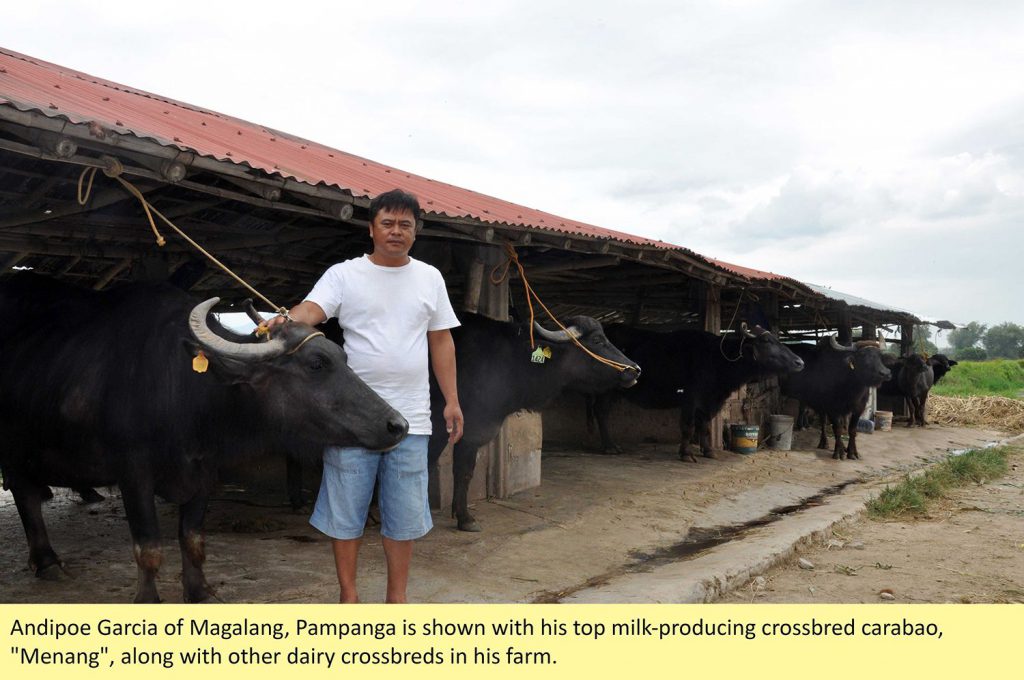Andipoe Garcia’s fondness for his crossbred dairy carabaos is unmistakable: Each animal in his herd has a name.
And among the animals, he is proudest of “Menang”, which produces as much as 14 liters of milk a day for three months. In her other months of lactation, she gives seven to eight liters a day.
“I also have ‘Marisa’, ‘Bilyang’, ‘Elyang’ and 18 others more like them, but they can’t beat my “Menang” in milk production,” Garcia, who hails from Sitio Mapiña, Barangay San Ildefonso, Magalang, Pampanga, hastens to add.
His dairy animals are products of the crossbreeding of the native carabaos and the dairy-type, which is either the Murrah or Brazilian breed.
All told, Andipoe daily harvest amounts to an average of 56 liters of carabao fresh milk. He delivers the produce to the Angeles City-based Sussie’s, which specializes in food products wherein milk is an important ingredient. He sells the milk at P80 per liter.
An undergraduate, but honed in his younger years in the skills of raising native carabaos owned by his father, he was encouraged by Federico Libo, his brother-in-law, to enroll his carabao in the government’s crossbreeding program that utilizes the artificial insemination (AI) technique. In time, his carabao gave birth to crossbred calves which he describes as “dark in color and decidedly bigger than the native calves”.
When his crossbreds became mother carabaos, he started milking them. He sold his milk produce at P30 per “lapad” (rum bottle).
Among his crossbreds, he is very proud of “Menang”, now 12 years old, because of her milk performance. Compared to the native carabao’s yield of only about 1.5 liters of milk daily, crossbreds produce a lot more, resulting in higher daily income for the dairy carabao farmer.
Aside from the milk harvest, Andipoe also earns additional income from the sale of male calves. The yearlings are sold at some P18,000 each.
Andipoe credits his brother-in-law Federico for his entry into the field of dairy carabao farming. In their community, it was Federico who was the first to respond to the government’s call for the upgrading of the native carabaos through artificial insemination. He convinced Andipoe to follow suit. The rest, like they say, is history.
Currently, Andipoe has a herd of 34, some of which he has entrusted to a number of fellow farmers under a “paiwi” scheme in which he will be repaid in kind.
Associations established
The brothers-in-law have also made sure that their achievements in raising dairy carabaos and dairying would also be of help to the other farmers in their area. In 2009, they initiated the formation of the Mapiña Carabao Owners Association (MCOA).
The MCOA, which is headed by Andipoe, is composed of 25 farmer-members whose total animal holding comprise some 350 crossbreds.
The association collects a total of 100 to 150 liters of milk a day. Most of the produce is processed by members of the Mapiña Panol ng Kabuhayan (MPK), which is composed of the wives of the MCOA farmer-members. Processing is done at MCOA’s newly-established processing plant-cum-office and outlet.
LGU-PCC tie-up
The local government unit of Magalang and the Philippine Carabao Center at Central Luzon State University (PCC at CLSU) collaborates in ensuring the smooth implementation of the carabao upgrading program in Sitio Mapiña. The help of other entities, who also believe in the program, has likewise contributed to the success of the farmers in the program in this Magalang sub-village.
“The MCOA is our town’s model association in Magalang,” Milagros D. Suing, the town’s Municipal Agricultural Officer (MAO), said. “We always point out to our farmers who want to go into dairying to emulate what the officers and members of MCOA did in embracing the program,” she added.
“The MCOA is also proving to be our showcase of a well-implemented Carabao Development Program (CDP) in the whole of Pampanga,” Suing further said.
The dedicated service of the two technicians in the Magalang agricultural office and the wholehearted support of Magalang Mayor Romy Pecson in the program are also huge factors in helping the farmers of Sitio Mapiña in their achievements under the CDP.
“We never tire of going to Mapiña to extend our services,” said Crisanto G. Muñoz, AI technician.
“We personally extend our services to them, even using our personal money to visit the place and going house-to-house to deliver AI services to the breedable carabaos,” he added.
He said Mayor Pecson has allotted an annual budget of Php200,000 for the needed supplies and materials.
Muñoz also said that they acquired much of their knowledge and skills in the practical application of the technologies through the trainings and seminars provided by the PCC at CLSU.
He also pinpoints the achievements of Mapiña as the best example of a successful crossbreeding program and its now emerging enterprise being run by the women-folk in that area.
“We are pushing Mapiña as our ‘crossbred carabao capital’ in the sub-village level,” Muñoz said.
Piece of advice
Given his experience as a progressive crossbred carabao raiser, Andipoe Garcia shared his advice to farmers aspiring to succeed in dairying. He said that dedication and hard work are vital for this kind of endeavor.
“It is important that you love what you are doing and it should be with all your heart,” he added.

